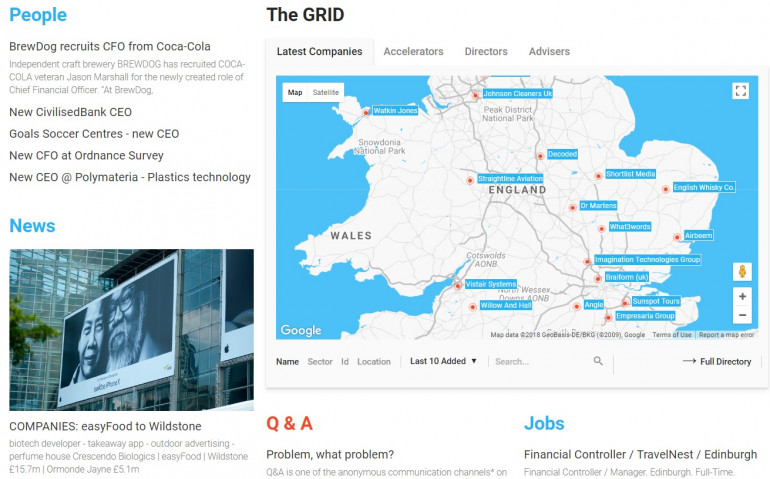Published by Directorzone Markets Ltd on August 22, 2016, 9:00 am in News, Other

News about 7 UK growth companies and/or accelerators + turnover in the GRID marketplace, 7th - 20th August 2016:
Itsu £82.6m | Carwow £3.2m | Homefirth Vineyard | Stopham Vineyard | South Crofty | Cambridge Innovation Capital | Isabella Oliver £9.6m.
ITSU: profits chopped | Peter Evans, The Sunday Times. August 14.
Japanese food chain Itsu boss rolls up 50pc pay rise after record sales | Ashley Armstrong, The Telegraph. August 13, 2016.
DZ profile: Itsu [grocery] Ltd
Business: takeaway sushi chain which opened the first Itsu outlet in Chelsea, southwest London, in 1997. Has branched out of the capital and now operates in Oxford, Bicester Village and Brighton. Itsu’s expansion during the year included two stores in Westfield shopping centre in White City in west London and Bicester Village, in Oxfordshire, as well as its first travel hub locations, at Stansted airport in Essex and Euston station in London. The group has opened another six stores so far this year, lifting its total to 69, of which 58 are in London, and a spokesman confirmed that it was actively “appraising international opportunities”, initially in America and France.
Launched: 1997
Founder: Julian Metcalfe, 56, also co-founded Pret a Manger with Sinclair Beecham in 1986, shared a £50m payday after selling a third of Pret to McDonalds in 2001.He turned it into a high street staple before selling most of his stake to private equity giant Bridgepoint in 2008.
Staff: Clive Schlee, Pret’s chief executive, is a director of Itsu
Financials: reported a 22% increase in revenues to £82.6m last year. However, profits dropped to £434,150 from £1.6m as the company invested in new stores outside London and an overhaul of its IT system ....technology costs associated with the launch of a delivery app. The company’s “itsu to you” service suffered teething problems in March after its introductory discount voucher went viral, crashing the new app.
Investment: Mr Metcalfe who remains the majority shareholder among a group of four private investors including Clive Schlee, the current boss of Pret and Gerard Loughran, the company’s former chief executive.
News:
1. Itsu briefly had a store in New York City a decade ago, but Mr Metcalfe quickly withdrew from the joint venture, admitting: “I chose the wrong partner.”
2. Like-for-like sales so far this year are understood to have been at similar levels to those of last year, and the company has also entered the delivery market with partners including Deliveroo.
3. Planned openings this year include a return to Heathrow Terminal 5 in late summer.
4. Itsu’s latest accounts showed that the salary of its highest paid director, thought to be founder Julian Metcalfe, jumped from £400,000 to £600,000 in the last two years. Last year he was paid £550,000.
5. Earlier this year, Mr Metcalfe sold a 26pc stake in his snacks business, METCALFE’S SKINNY, to crisp maker KETTLES CHIPS. Mr Metcalfe has said that he wants to expand his popcorn and chocolate-covered rice snacks range across Europe and into America.
UPDATE:
Itsu, founded by Julian Metcalfe, bites into the big apple | Peter Evans, The Sunday Times. November 5, 2017.
6. Sushi chain Itsu is to open its first US restaurant early in the new year, in New York’s fashion district.
Itsu has more than 70 restaurants in Britain, mostly in London. The Manhattan site will be its first outside the UK.
7. Last year, Itsu’s sales rose by 17% to more than £100m. It plans to open up to 10 restaurants next year, most outside London.
CARWOW: Buy a new motor — without the haggling | Laura Onita, The Sunday Times.
DZ profile: Carwow Ltd
Business: online market that puts buyers in touch with dealers. Carwow is similar to Autotrader, but for new vehicles. Users click on what car they want and an alert is sent to its 1,500 registered dealerships across Britain. Dealers will typically pocket a bonus if they meet specified sales targets, and have long been prepared to offer discounts to savvy buyers. Carwow liberates consumers from forecourt haggling. The service is free for users, with dealers paying a fee based on the number of vehicles sold. Its customers spend an average of £27,000 on a new car, with the website claiming to slash up to £3,600 off the regular forecourt price.
Launched: 2011
Location: central London
Founders: James Hind, 29, Alexandra Margolis, 29, and David Santoro, 32, IT developer
Staff: 70
Financials: sales of £3.2m last year
Investment: The three invested £20,000 of their savings to get the company off the ground. Despite the losses, a string of angel investors and venture capitalists — including Zoopla’s Alex Chesterman and the backers of Betfair, Lovefilm and Spotify — have ploughed £19m into Carwow. The trio own about a third of the company. They expect to part with more equity to fuel growth but vow to fend off investors who want to “add money and nothing else”, for a quick buck. “We are first-time entrepreneurs and we want advice from people who’ve ‘been there, done that’,” said Hind.
News:
1. recently launched a £6m TV ad campaign, using the voice of actor Sir Michael Gambon.
2. The business, which says it has sold £1bn worth of motors in three years, recently expanded into Germany and it aims to enter other European markets.
UPDATE:
Investors pour £30m into Carwow | Oliver Shah,The Sunday Times. July 30 2017
3. James Hind, who worked as an intern in the City and a ski instructor before starting work on Carwow in 2009, has closed a round of funding led BY VITRUVIAN PARTNERS. ACCEL PARTNERS and BALDERTON CAPITAL, which were already investors in put in more money. The company says it has acted as a portal for more than £2bn worth of car sales since it went live in 2013.The £30m investment comes on top of £18m already raised. Hind said the money would be used for marketing campaigns and growing its network of dealerships.
4. Carwow’s rise has not been without controversy. BMW initially banned its dealers from using the site, the German marque relenting after Carwow complained to the Competition and Markets Authority, which threatened to investigate.
HOMEFIRTH VINEYARD: You need a lot of Yorkshire bottle to take on Bordeaux | Emma Broomfield, The Sunday Times.
DZ profile:
Business: seven-acre vineyard. They grow a hybrid vine that favours cooler climates. However, as a business, Holmfirth Vineyard makes most of its money from the 30,000 visitors it attracts every year to its restaurant, cafe and holiday cottages. But the couple can still boast great success from their vines — they have already sold out this year’s vintage of 8,000 bottles.
Launched: 2007
Location: West Yorkshire
Founders: Ian, 43, and Becky Sheveling, 44.
Staff: 18
STOPHAM VINEYARD
DZ profile:
Business: Vineyard with 21,000 vines. Since 2012, the wine produced at Stopham — between 30,000 and 45,000 bottles a year — has been hugely successful, recently being selected by Marks & Spencer.
Launched: 2007
Location: South Downs National Park
Founder: Simon Woodhead, 50
News: The founder recalls the summer of 2012, when his whole harvest was wiped out. “Old hands in France say that in 30 years you can have 30 different summers — and they’re absolutely right”, said Woodhead, who is one of two full-time staff.
SOUTH CROFTY: Cornwall comes round to tin mine revival | James Wilson, FT. August 16.
DZ profile:
Business: South Crofty, the last Cornish tin mine to fall victim to a devastating price slump has been shut for almost two decades and most of its workings are flooded. It looks set for a rebirth. The fact that it operated until 1998 gives South Crofty advantages, including mineral rights and a mining licence that lasts for decades. Beneath South Crofty’s prominent winding gear are hundreds of miles of tunnels and shafts, where narrow workings are thought to date back to the Elizabethan era. Other infrastructure, such as a wide road to the mine’s underground levels, is adequate for modern mining.
Location: Redruth
Staff: Chief Executive Officer Richard Williams
Investment: Strongbow Exploration Inc., a Canadian company, bought it out of administration last month
News:
1. Strongbow Exploration could have the mine in production by 2019 or 2020, delivering 20 tons of tin a day, at an estimated cost of £100m, according to Richard Williams.
2. Water has flooded in, however. To pump the workings dry within a viable period — up to two years — the company needs permission to more than double the permitted level of discharges.
3. Mr Williams says South Crofty — where 400,000 tonnes of tin is estimated to have been mined over the centuries — is still a “world-class deposit”, with 2.5m tonnes of ore containing an estimated 44,000 tonnes of tin, and potential for more.
4. Strongbow Exploration is considering a UK stock market listing for its South Crofty project, seeking to capitalise on local investor interest in its Cornish mining plans and following a path travelled by other miners and explorers eyeing British minerals. Richard Williams, chief executive, said the objective is to “try to get listed on Aim [the junior London market] as soon as possible, hopefully next year,” he said. Interest from retail shareholders in Yorkshire has supported shares in Sirius Minerals, which has approval to build a fertiliser mine in the county. Shares in Sirius have more than doubled this year, as has stock in Dalradian Resources, which owns a gold project in Northern Ireland. Both are quoted on Aim.
CAMBRIDGE INNOVATION CAPITAL: Cambridge university start-up fund raises £75m ahead of IPO | Clive Cookson, FT. August 19, 2016
DZ profile: Cambridge Innovation Capital Plc
Business: commercialises science and technology from Cambridge university. As the university’s “preferred investor”, CIC works closely with Cambridge Enterprise, the university’s technology transfer arm, which offers co-investment opportunities and access to pre-emption rights over companies spun out of the university.
CIC has invested £33m in 13 start-up companies, originating both from the university and from the wider Cambridge technology cluster. Typically, it makes investments in the £2m-to-£5m range.
Launched: 2013
Staff: Victor Christou, chief executive
Investment: The UNIVERSITY OF CAMBRIDGE is the largest shareholder in CIC, owning almost one-third of the company both directly and through its endowment fund ....founded CIC with an original £50m investment, which came from its own funds as well as outside investors including LANSDOWNE PARTNERS, one of the largest hedge funds in London, and ARM HOLDINGS, the technology group. Existing shareholders have been joined by new investors such as WOODFORD INVESTMENT MANAGEMENT, WINTON VENTURES and the OMAN INVESTMENT FUND. CAMBRIDGE UNIVERSITY will remain the largest shareholder, owning about a third of the company.
News:
1. new funding round - has raised £75m ahead of a flotation planned in the next 18 months. .... was oversubscribed. ....CIC will have around £95m to invest over the next two or three years.
2. ...operates aN so-called “evergreen fund” strategy, which provides long-term capital to support growth without being driven to seek an exit by selling shares in businesses prematurely after a fixed period.
3. The closest equivalents to CIC are IMPERIAL INNOVATIONS and IP GROUP, both of them well-established public companies. Another similar company is the Wellcome Trust’s wholly-owned SYNCONA evergreen fund.
4. The 13 investments made so far by CIC are divided almost equally between healthcare and technology sectors. The £33m has also brought in about £70m from co-investors. One investment has been made in CONGENICA, a spinout from the Wellcome Trust Sanger Institute, which develops computer programs to decode genetic diseases from DNA data. Another has been made in JUKEDECK, set up by a Cambridge music graduate to bring artificial intelligence to music composition — for example, creating backing tracks for computer games and videos. The latest investment, announced last month, is in CAMBRIDGE MEDICAL ROBOTICS, which is developing robots to carry out minimal access, keyhole surgery.
UPDATE:
Cambridge fund raises £150m in year’s largest UK tech round | Clive Cookson, FT. 1 April 2019
5. ….third private financing round, to be announced on Monday, is the largest by any tech company in the UK this year.…a further £150m to invest in science and technology companies in and around the city. ... total amount raised by CIC since its foundation in 2013 is £275m. 30 investors from the UK, Europe, North America and Asia …. UK shareholders include WOODFORD INVESTMENT MANAGEMENT, WINTON VENTURES and LANSDOWNE PARTNERS.
6. An IPO remains an option in the long term but not in the near future.
7. CIC benefits from “preferred investor” status with the university, which provides privileged access to academics’ intellectual property through CAMBRIDGE ENTERPRISE, its technology transfer arm. However, no more than half of the 25 companies in which CIC has so far invested are spinouts from the university.
8. The other half are non-university science and technology businesses in the Cambridge area. ...i.e. CMR SURGICAL, a medical robotics company set up in 2014 by five people who had been working for Sagentia, a local technology consultancy. Last year CMR raised $100m from a syndicate of investors including CIC to develop a system for minimally invasive surgery, inspired by the human arm, and it already has 280 employees in Cambridge.
9. CIC company, INIVATA, spun out of Cancer Research UK’s Cambridge laboratory has raised £40m to develop a “liquid biopsy” test that diagnoses lung cancer from patients’ blood samples. CIC also supports biotech companies developing treatments for cancer, such as BICYCLE THERAPEUTICS and CARRICK THERAPEUTICS.
10. Investments outside life sciences include PRAGMATIC (flexible electronics), IMAGEN (video management software) and GEOSPOCK (integrating spatial data on a large scale). CIC has so far favoured investments in the £3m to £5m range, leading syndicated funding rounds in conjunction with other investors. But larger investments may be required in future when the former start-ups need more money as they approach commercialisation.
ISABELLA OLIVER: Clothes range was born from a maternity fashion malfunction | Laura Onita, The Sunday Times. August 7
DZ profile:
Business: pregnancy attire fashion label now sells its products in more than 160 countries Fans of her maternity dresses, which sell for about £100 each, include singer Gwen Stefani and actresses Angelina Jolie and Halle Berry. Their wares are manufactured in Portugal and sold online, although Isabella Oliver is also stocked by high street chains John Lewis and House of Fraser.
Location: HQ in Kentish Town, northwest London
Founder: Baukjen de Swaan Arons, 45, Dutch-born designer and entrepreneur, with her husband Geoff. The couple own about 80% of the business, with the remainder split between family and friends.
Staff: 60
Financials: made sales of £750,000 in its first year. Last year the two brands made a loss of £1.6m on sales of £9.6m.
Investment: They injected £5m to launch Baukjen during the recession, tipping Isabella Oliver into the red. However, eight months ago, they returned to the black. She said the company has made profits of £300,000 so far this year, while revenues are expected to reach £11.5m.
News:
1. Almost all its revenues are made abroad, earning it a Queen’s Award for international trade in 2010.
2. Arons believes that traditional tailoring techniques, such as wrapping and ruching, have made the brand stand out and complement her customers’ physiques. “We invest in fabrics we ourselves wear and wash — they don’t fall apart after three months.”
3. In 2010 the pair launched the Baukjen womenswear brand, hoping to emulate the success of their first venture. “Maternity wear is a niche market and the relationship with the customer lasts as long as the pregnancy. We wanted to get into a market where we had a longer-term relationship.”
4. Arons aims to tap into the Chinese and Scandinavian markets with Isabella Oliver and increase the demand for Baukjen in Britain, as well as diversify into other product areas.
5. A couple of days after Brexit, a deal with a prospective investor fell through. “They pulled out because they didn’t want to increase their exposure to the British market,” Arons explained.








